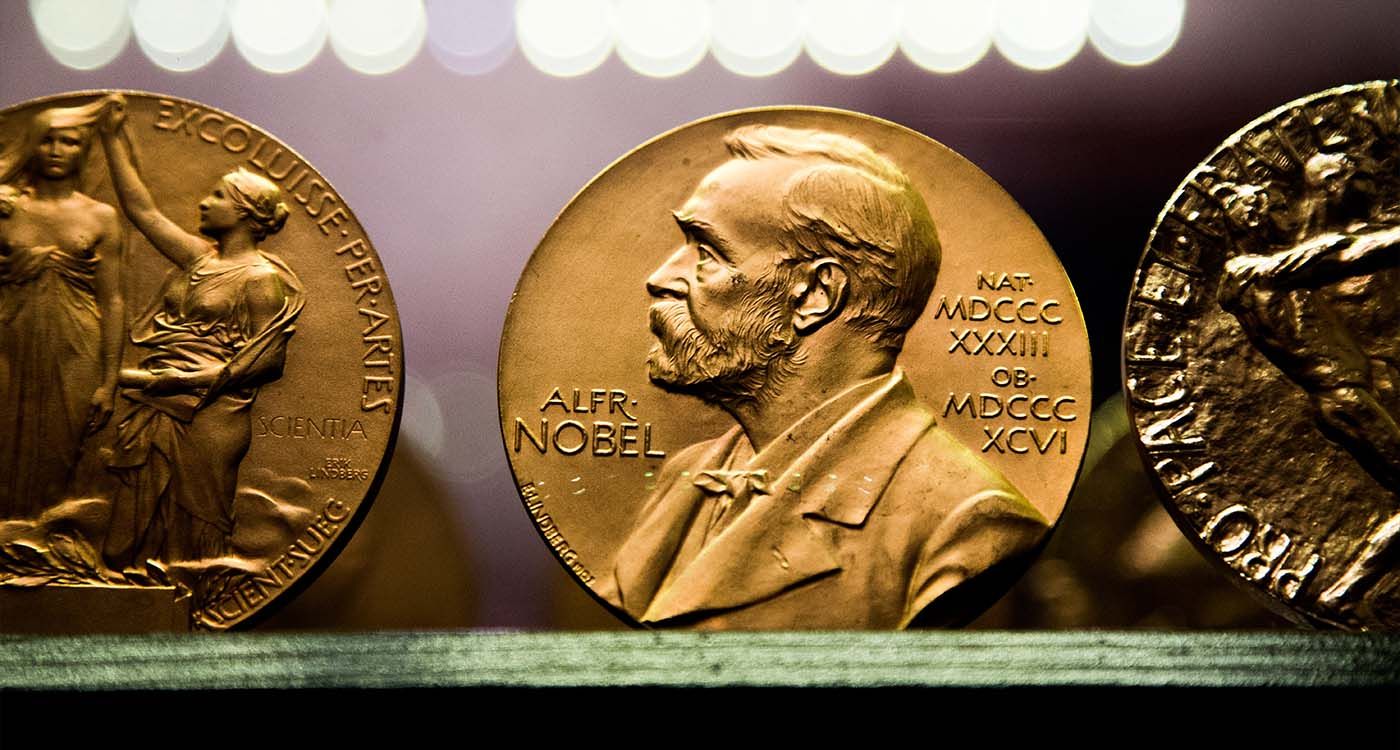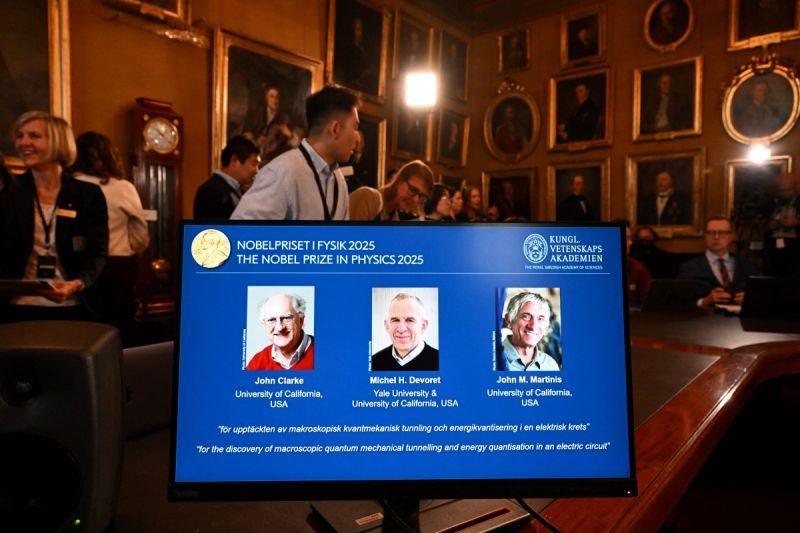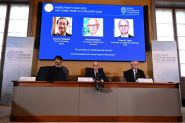- Home
- Middle East
- All Eyes on the 2025 Nobel Prizes: What You Need to Know

A close-up of Nobel Prize medals showcasing Alfred Nobel’s portrait and the intricate artistry that symbolizes global recognition of excellence in science, literature, and peace. ©Jeppe Gustafsson / Shutterstock.com
The 2025 Nobel Prizes have officially begun, with the Royal Swedish Academy of Sciences awarding the prizes for medicine on Monday and physics on Tuesday.
Mary Brunkow, Fred Ramsdell, and Shimon Sakaguchi won the Medicine Prize for discoveries on immune system function, while John Clarke, Michel H. Devoret, and John M. Martinis received the Physics Prize for revealing quantum tunnelling and energy quantization in circuits.
The other Nobel categories in chemistry, literature, peace, and economics will be announced through October 13.

John Clarke (UK), Michel H. Devoret (France) and John M. Martinis (US) win the Nobel Prize in Physics 2025, 'for the discovery of macroscopic quatum mechanical tunnelling and energy quantisation in an electric circuit', it was announced on October 7, 2025. (Photo by Jonathan Nackstrand / AFP)
How Did the Nobel Prize Come About?
The Nobel Prize is one of the most prestigious awards in the world, honoring some of the most celebrated and revered international figures and organizations in history.
The award was established by Swedish chemist Alfred Nobel, mostly known for his discovery of dynamite.
In his 1895 will, Nobel wanted his fortune to be used to award five prizes in physics, chemistry, medicine, literature, and peace, illustrating his commitment to science and his passion for literature.
Many have speculated that Nobel created the Peace Prize out of regret, as his name was linked to inventions used in the war, though he never expressed such sentiments.
Instead, historians attribute Nobel’s creation of the Peace Prize to his friendship with Austrian pacifist Bertha von Suttner, one of the leaders of the international peace movement and the first woman to be awarded the Nobel Peace Prize.
In 1968, Sweden’s central bank, Sveriges Riksbank, announced the creation of the Prize in Economic Sciences, adding a sixth category to the prominent award.
How Does the Nomination Process Take Place?
Each year, experts, past winners, and academics are invited by the Nobel Comittees to submit their nominations by January 31.
However, all nomination information remains confidential for 50 years in an effort to preserve secrecy and independence. Only nominators may choose to reveal their own submissions.
Martin Luther King Jr. is a prime example. Although he won the Nobel Peace Prize in 1964, no one knew who had nominated him until 2014, 50 years later.
His nominators turned out to be the Religious Society of Friends, who had previously received the prize, along with eight members of the Swedish Parliament.
While a person cannot nominate themselves, they can be nominated multiple times by others.
Jane Addams, recognized as the founder of social work in the United States, was nominated 91 times before finally being awarded the prize.
In addition, if the Nobel Committees decide that none of the nominations meet the criteria or if circumstances prevent a proper decision, the prize can be reserved or not awarded.
In 1948, after Mahatma Gandhi was assassinated, the Nobel Committee considered awarding him the prize posthumously, but ultimately decided not to award the Peace Prize to anyone that year. Their official reasoning was that “there was no suitable living candidate.”
Committees later spend months reviewing entries and consulting specialists to narrow the list of candidates.
Unlike the Peace Prize, which considers the work of laureates from the past year, the Science Prize can take decades to be confirmed. Judges need to ensure that the scientific discoveries are impactful and stand the test of time.
Who Awards the Nobel Prizes?
The prizes for physics, chemistry, and economics are awarded in Sweden by the Royal Swedish Academy of Sciences, and that of medicine is awarded by the Nobel Assembly at the Karolinska Institutet.
However, the Peace Prize is awarded in Norway by the Norwegian Nobel Committee.
The decision to award the Peace Prize in Norway was written in Nobel’s will. Historians believe he did this because Norway had a strong peace movement and a reputation for international diplomacy. Sweden, in contrast, had a more militaristic government at the time.
This year’s Nobel Prizes are set at 11 million Swedish kronor, equivalent to 1.2 million USD each. If the prize is shared by multiple laureates, the sum is divided.
Donald Trump and the Nobel Peace Prize
The Nobel Peace Prize has drawn significant attention because of U.S. President Donald Trump, who recently declared he deserved the prize for “ending seven wars,” and possibly ending the Gaza war.
Israeli Prime Minister Benjamin Netanyahu and Pakistan’s government nominated Trump for the Peace Prize, with both nominations being made after the 2025 deadline.

Israeli Prime Minister Benjamin Netanyahu hands off a letter Netanyahu sent to the Nobel Peace Prize committee to nominate U.S. President Donald Trump for the Nobel Peace Prize during a dinner in the Blue Room of the White House on July 07, 2025 in Washington, DC. (Andrew Harnik/Getty Images/AFP)
For many years, the Nobel Peace Prize was predominantly awarded to European and North American men.
But in recent years, significant changes have been taking place, making the prize more global than ever.
Throughout history, 23 organizations and 103 individuals (87 men and 16 women) have received the Nobel Peace Prize.
Revolutionary Laureates
Throughout history, the Nobel Prizes have honored extraordinary achievements in science, literature, and peace.
Among the most famous laureates, Albert Einstein stands out in Physics for his theory of relativity and groundbreaking work on the photoelectric effect.
Marie Curie remains a legend in Chemistry as the only person to win Nobel Prizes in two different sciences.
In Medicine, Alexander Fleming is celebrated for discovering penicillin, revolutionizing healthcare.
In Literature, Gabriel García Márquez captivated the world with his magical realism.
The Peace Prize has recognized global icons such as Martin Luther King Jr. for his civil rights leadership. In Economics, Amartya Sen is renowned for his insights into welfare and social justice.
Their legacies stand as milestones in humanity’s constant pursuit of knowledge, justice, and truth.
Read more



Comments